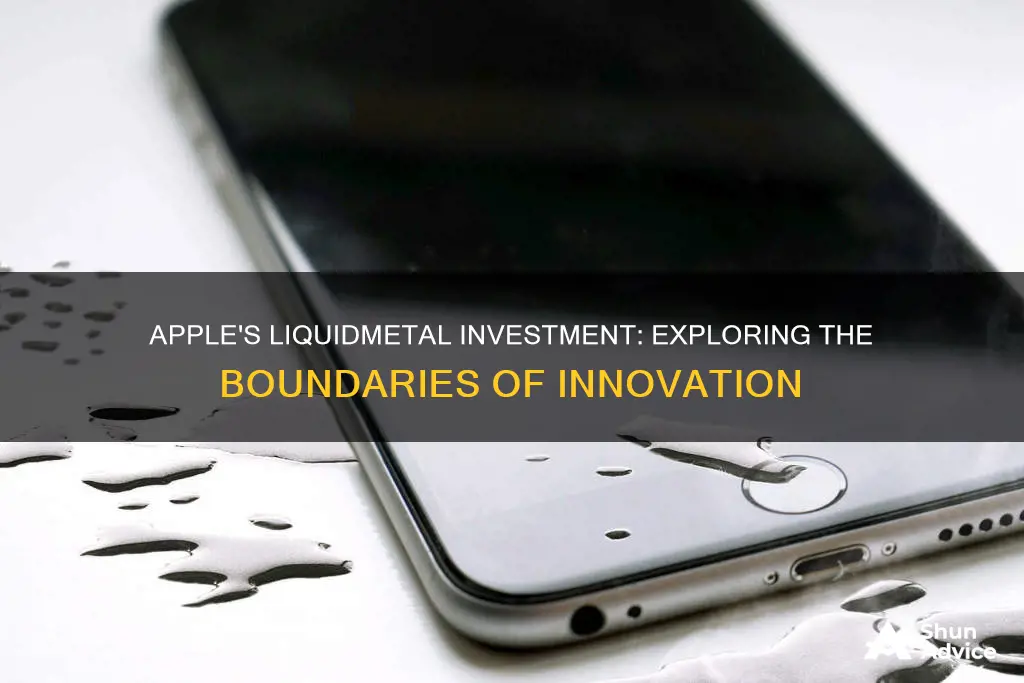
In 2010, Apple entered into an exclusive agreement with Liquidmetal Technologies to license its unique metal alloy for an undisclosed sum. Liquidmetal Technologies used the proceeds from the deal to pay off its debts, indicating that the deal was worth at least $10.9 million. The agreement was extended several times, with Apple retaining the rights to the metal alloy for its production processes. While there has been much speculation about Apple's use of Liquidmetal, the company has not yet widely incorporated the technology into its products. One co-inventor of Liquidmetal suggested that Apple might be waiting for a breakthrough product that would be made possible by Liquidmetal technology.
| Characteristics | Values |
|---|---|
| Date of agreement | August 5, 2010 |
| Type of agreement | Exclusive license |
| Purpose | To license the use of Liquid Metal's amorphous metal alloys |
| Agreement details | Apple granted a perpetual, worldwide, fully-paid, exclusive license to commercialize Liquid Metal's intellectual property in the field of consumer electronic products |
| Payment | One-time payment of $20 million |
| Liquidmetal's use of funds | Paid off $10.9 million in debt |
| Liquidmetal's material | A metal alloy developed by a research team at the California Institute of Technology |
| Metal alloy properties | Harder than alloys of titanium or aluminum; stronger and more durable than stainless steel; resistant to wear and corrosion; lighter |
| Possible applications | Hinge or bracket in a MacBook; casing for gadgets; internal device components |
| Challenges | Prohibitively expensive due to containing large amounts of platinum; requires further investment to mature the technology |
What You'll Learn

Liquidmetal's unique qualities
Liquidmetal is a unique type of metal with a range of qualities that set it apart from other materials. Its atomic structure is amorphous, meaning its atoms are arranged randomly, similar to a liquid or plastic. This gives it the ability to be injection-moulded into precise shapes, much like plastic, while still retaining the strength and properties of metal. In fact, Liquidmetal is nearly twice as strong as titanium alloys.
Liquidmetal also has excellent corrosion resistance, dimensional tolerance, and elasticity. Its amorphous atomic structure prevents plastic deformation and gives it the elasticity of spring steel. This means that, unlike other metals, it is not very rigid or brittle. Liquidmetal's high elasticity makes it highly rated for use in sports equipment, such as golf clubs, baseball bats, and tennis racquets.
Another standout feature of Liquidmetal is its combination of mechanical hardness, high elasticity, and corrosion resistance, which makes it highly wear-resistant. It has been used as a protective coating for industrial machinery and in applications where titanium would typically be used, such as medical instruments, cars, military equipment, and aerospace components.
Liquidmetal's ability to be cast and moulded, along with its high wear resistance, has led to its use in consumer electronics. For example, it has been used in the casing of some mobile phones, flash drives, and MP3 players, as well as for the SIM ejector tool in some iPhone models.
Conservative Investing in Retirement: Strategies for a Secure Future
You may want to see also

Apple's exclusivity deal
In 2010, Apple entered into an exclusive agreement with Liquidmetal Technologies to license the use of Liquid Metal's amorphous metal alloys. This unique metal alloy is almost 2.5 times stronger than titanium and about 1.5 times harder than stainless steel. It is also lighter, more resistant to wear and corrosion, and can be used to create thinner, smaller designs in products while offering greater protection for internal components.
The deal was likely worth at least $10.9 million, as Liquidmetal paid off $10.9 million in debt after the agreement was signed. Apple made a one-time payment of $20 million for the license, which grants them:
> [A] fully paid-up, royalty-free, irrevocable, perpetual, worldwide exclusive license and sublicense, with the right to grant sublicenses, under the LMT Technology in the exclusive field of use of Consumer Electronic Products, to use, reproduce, publish, display, distribute, perform, exploit and disclose the LMT Technology.
Liquidmetal Technologies, in turn, granted Apple:
> [A] perpetual, worldwide, fully-paid, exclusive license to commercialize such intellectual property in the field of consumer electronic products, as defined in the license agreement, in exchange for a license fee, and (iii) CIP granted back to us a perpetual, worldwide, fully-paid, exclusive license to commercialize such intellectual property in all other fields of use.
The agreement has been extended multiple times, with the latest extension announced in 2015, lasting until February 2016. While there has been much speculation about Apple's use of Liquidmetal technology, the company has not made any official announcements, and it is unclear whether any existing Apple products use it.
Broaden Your Horizons: Diversifying Retirement Investments Across Nine Key Areas
You may want to see also

Liquidmetal's applications
Liquidmetal is a super-special "metallic glass" that Apple has licensed exclusively since 2010. It is a liquid metal or a metal alloy that is liquid at or near room temperature. It has a unique atomic structure, allowing it to be injection-molded into precise shapes while maintaining the properties of metal.
Liquidmetal has a wide range of applications, including:
- Electronics casings for cell phones, components for golf clubs, watch cases, and medical devices
- Heat transfer systems, thermal cooling and heating designs, and liquid metal can be used as a thermal interface material between coolers and processors
- Liquid metal can be used for wearable devices and for spare parts
- Liquid metal can be used for biological applications, i.e., making interconnects that flex without fatigue
- Liquid metal can be used for soft robotics
- Liquid metal can be used for stretchable electronics
- Liquid metal can be used for reconfigurable devices
Invest or Repay: Navigating the Credit Card Conundrum
You may want to see also

Liquidmetal's challenges
Liquidmetal, a "metallic glass" with a unique atomic structure, has been exclusively licensed to Apple since 2010. However, Apple has barely used it, and there are several challenges associated with its commercialisation and implementation.
Firstly, Liquidmetal is expensive. It costs around $10 to $20 per gram, significantly more than thermal pastes, which typically range from $1 to $5. This high cost could make it challenging for Apple to incorporate Liquidmetal into its products without significantly increasing prices for consumers.
Secondly, Liquidmetal is challenging to work with. It requires careful and precise application, and any spills or leaks can be detrimental. Surfaces must be thoroughly cleaned, and a very thin layer of Liquidmetal must be evenly spread. This process is intricate and time-consuming, requiring a high level of expertise.
Thirdly, Liquidmetal is highly corrosive. It can react with aluminium, copper, nickel, and solder, causing deterioration or short circuits. This corrosiveness necessitates the use of compatible coolers with copper or nickel-plated bases and the protection of surrounding areas with electrical tape or nail polish. Ensuring that Liquidmetal does not come into contact with other components during manufacturing or use presents a significant challenge.
Additionally, Liquidmetal investors have expressed disappointment with Apple's lack of utilisation of the technology. While Apple has the sole rights to use Liquidmetal in consumer electronics, Liquidmetal investors will not receive any royalties from Apple, regardless of whether the alloy is implemented in Apple products. This means that investors are not benefiting financially from the partnership as they had hoped.
Finally, there is a challenge of scale. Atakan Peker, a co-inventor of Liquidmetal, suggested that Apple would need to invest an additional $300 million to $500 million over 3 to 5 years to mature the technology for large-scale use. This significant investment may be a barrier for Apple, especially considering the uncertainty of the payoff.
In conclusion, while Liquidmetal has unique and promising properties, there are several challenges that Apple must navigate before incorporating it into their products.
Strategic Spending: Unlocking Potential with Key Investments
You may want to see also

Liquidmetal's future
Liquidmetal is a unique "metallic glass" with an amorphous atomic structure that is harder than alloys of titanium or aluminium. It is also lighter, stronger, scratch- and corrosion-resistant, and more elastic than other metals. The technology allows for thinner, smaller designs in products while offering greater protection for internal components.
Apple has had an exclusive agreement with Liquidmetal Technologies since 2010, with several extensions since then. Apple paid a one-time fee of $20 million for the rights to use Liquidmetal in consumer electronic products. The deal also allows Liquidmetal to use Apple's inventions in fields other than consumer electronics.
Liquidmetal has been used in past devices such as the Nokia Vertu smartphone, Sandisk Sansa media player, and Sandisk U3 Smart thumb drives. It has also been used to create hinge components for flip smartphones.
While there has been much speculation about how Apple will utilise Liquidmetal in its products, there has been no official announcement to date. One of the researchers behind Liquidmetal, Atakan Peker, has suggested that it will likely first be used in a MacBook as a hinge or bracket, rather than for the casing. Peker also believes that Apple will need to invest another $300-500 million over 3 to 5 years to mature the technology before it can be used on a large scale.
In summary, Liquidmetal's future prospects look promising, with its unique characteristics and the ongoing partnership with Apple. However, the company may need to secure additional investments and explore commercialisation opportunities outside the consumer electronics space to fully realise the potential of its technology.
The Power of Compounding: Unlocking Investment Growth
You may want to see also
Frequently asked questions
In 2010, Apple entered into an exclusive agreement to license the use of Liquid Metal's amorphous metal alloys with unique atomic structures, used to create products that are stronger, lighter, and resistant to wear and corrosion. Apple will likely wait to use Liquidmetal in a breakthrough product made possible only by Liquidmetal technology.
Liquidmetal is a super-special "metallic glass" with unique properties. It is almost 2.5 times stronger than titanium and about 1.5 times harder than stainless steel. It is also lighter, stronger, scratch- and corrosion-resistant, and more elastic.
Liquidmetal's value proposition was a unique amorphous alloy targeted to be used in electronics casings for cell phones, components for golf clubs, watch cases, and medical devices. Liquidmetal's patented amorphous alloy is a metal comprised of zirconium, titanium, copper, nickel, and beryllium.







